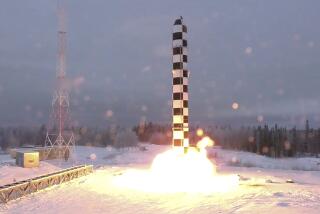Soviets Offer Longer A-Test Moratorium : Gorbachev Says He’ll Agree to 6-Nation Request if U.S. Does
- Share via
MOSCOW — Soviet leader Mikhail S. Gorbachev said today that he will agree to an international request for a one-year extension of his moratorium on nuclear tests if Washington follows suit.
But he warned that the Soviet Union will not consider extending its six-month moratorium on nuclear tests, which began Aug. 1, unless the United States participates in the ban.
“We could go to the prolongation of our moratorium after Jan. 1, 1986, if the United States joins it,” Gorbachev said in a letter printed in the Communist Party newspaper Pravda.
“Moreover, we are prepared already now, today, for a timeless treaty ban on all nuclear weapons tests,” Gorbachev said.
The letter was a response to the leaders of six countries who last week urged Moscow and Washington to begin a one-year ban on all nuclear tests starting Jan. 1.
Agrees With Their Hope
Gorbachev said he agrees with their hope for a ban on nuclear explosions, saying it would slow down the development of nuclear weapons and “tangibly undermine” the arms race.
“Whether the Soviet moratorium will continue to be in effect after the mentioned date (Jan. 1) expires depends totally on the United States,” Gorbachev said.
Gorbachev’s response was sent to Argentine President Raul Alfonsin, Mexican President Miguel de la Madrid, Swedish Prime Minister Olof Palme, Indian Prime Minister Rajiv Gandhi, Tanzanian ex-President Julius Nyerere (succeeded this week by Ali Hassan Mwinyi) and Greek Prime Minister Andreas Papandreou.
In a related development, Britain said today that it welcomed the prospect of a deeper dialogue with the Soviet Union but rejected an invitation to hold separate nuclear arms control talks with Moscow.
Foreign Secretary Sir Geoffrey Howe, delivering Britain’s formal reply to an offer in October by Gorbachev, told the House of Commons that Britain’s nuclear arsenal is not open to negotiation unless drastic cuts are first made in the nuclear stockpiles of the United States and the Soviet Union.
‘Ready to Look Afresh’
“We have made it clear that in those circumstances we should be ready to look afresh at the whole question,” he said.
More to Read
Sign up for Essential California
The most important California stories and recommendations in your inbox every morning.
You may occasionally receive promotional content from the Los Angeles Times.













